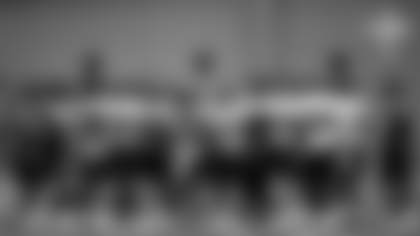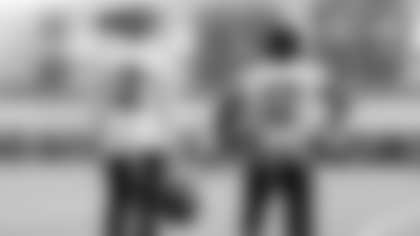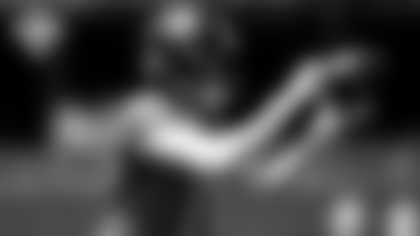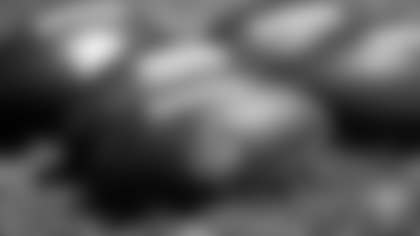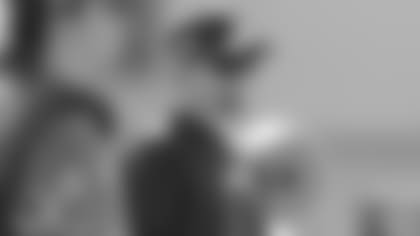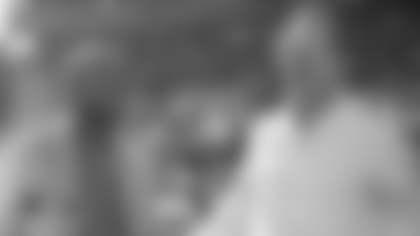In 2018, Ring of Famer Gene Mingo shared a number of stories about his time with the Denver Broncos in the early 1960s and about his life as a whole. These are just three of Mingo's many stories — presented to you in his own words, as he remembers them.
A HARSH REALITY
"In the early 1960s, when we went to play the Dallas Texans or the Houston Oilers, [and because we were playing in the South], we didn't stay in the same hotel as the white players. And that hurt us.
"There was a guy by the name of Wahoo McDaniel that played for us. The first year we had gone to Dallas to play, we pulled up in front of the Hilton hotel, and all the white guys were grabbing their bags and getting off the bus, and I got up along with Chuck Gavin and Lionel Taylor to get off the bus, and [we were stopped]. And Wahoo McDaniel lost it. He said, 'I want to stay with them [on the bus]. Why are you letting me stay here [with the white players]? I'm an Indian, and they're my teammates. Why can't I stay with them?'
"And if hadn't have been for Wahoo's sister, Wahoo would've gone with us and maybe it would've caused some trouble or friction. But we stayed in Ft. Worth, Texas, that's where they took us to. For two years in a row, we knew where we were going. The third year we were playing the Houston Oilers and we stayed in Houston for a week. Instead of us staying at Houston University, they had us stay at Texas Southern University.
"We were split up from our teammates — but the word teammate, that meant a lot to me. I'm going to protect you the best way I can."

UNEXPECTED KINDNESS
"I'll never forget my wife, Erma, and I had my little son, I was drafted away from the Oakland Raiders to the Miami Dolphins, and we went Paducah, Texas. I spent a week, two weeks or whatever down there with her mother and father, and I worked out, I went to Akron, Ohio.
"Then I took the eastern, southern route down to Miami. I had just purchased a brand-new Cadillac Coupe deVille — blood-red interior, all-white on the outside, two door. We're going down, and we're driving, driving, driving, and I needed to fill up. So we pull into this one gas station, and this old white guy comes out with his bib overalls, and he said, 'What can I do for you?' And I said, 'I'd like to fill up, sir, if I may?' And he said, 'Regular, or high octane?' I said, 'Just regular.' And he pumped the gas in, he was kind enough to wash the windows and check my oil. That's what they did back in those days.
"He came over to get the money, and before I handed him the money I said, 'Do you know where I can get something for my wife and son?' And he said, 'Yeah, if you go down the road here, there's a little restaurant. If they haven't closed, you can get something to eat there.' And so I took the money out of my wallet and into my right hand, and I was handing it to him. The only thing that made him change his mind and not look at the color of my skin was the ring I had on. I'm a 32nd-degree Mason. And he looked at that and said, 'Oh, you travel?' And I gave him the right words. And he said, 'What do you want to eat?' And I said, 'Well, just anything. Hamburger, cheeseburger, French fries, pop, or whatever.' He says, 'Pull around the back … No! Don't pull around the back. Just wait here in the car, and I'll go and get you something to eat.' He came out, and those were the best hamburgers and French fries I think I've ever had.
"After giving me the bags, he put his hands on the side of the door, and he said, 'Now I'm going to tell you something. When you go down this road, make sure you do the speed limit. Because there is a sheriff down there that would love to arrest you. There are some other people down there that might be upset because you have this nice car and this [lighter-skinned] lady. Do me a favor: Just drive slow.'
"Now that meant a lot to me, for this southern white man to tell me to be careful that there were other whites down the road that didn't accept me the way he did. He accepted that I was a Mason, and that helped."
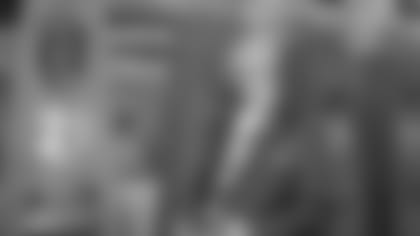
MAKING THE TACKLE
"My deal with kicking field goals is that it just became a natural thing. If you were to go back and look at some of the Broncos movies, at the beginning of the game, I was kicking off from the north end of the stadium to the south, you would always see me turn around and look up.
"After my mother passed, and I was looking up, if I saw a white cloud up there, everything was going to be OK. If I saw a mixture of gray and white, I knew I needed to play the game and be cautious. If I saw a dark cloud or it looked like it might storm that day, I had to be on my toes, because something was going to happen. And then I would turn around, I would pray to her, and I would kick off.
"I used to get fined by Frank Filchock for going down and making the tackle. I was supposed to be the safety valve, and — being that I didn't make that much money — he would take $15 out of my check. He said, 'Mingo, you'll learn. I told you, "You're the safety man — stay back." And here you are making the tackle.' And my teammates — we were in the Quonset hut — my teammates would say, 'Hell, Coach, he knows where he's going and he can get down and make the tackle.'
"That's the kind of ball I played! I couldn't sit back. I had to get down and make the tackle or do whatever I could."





